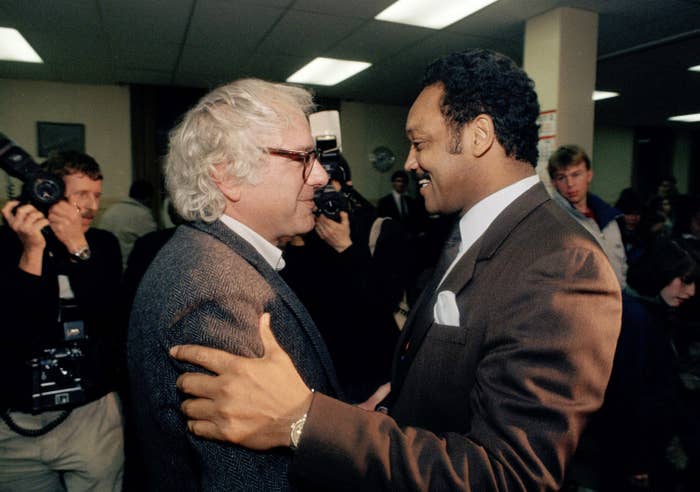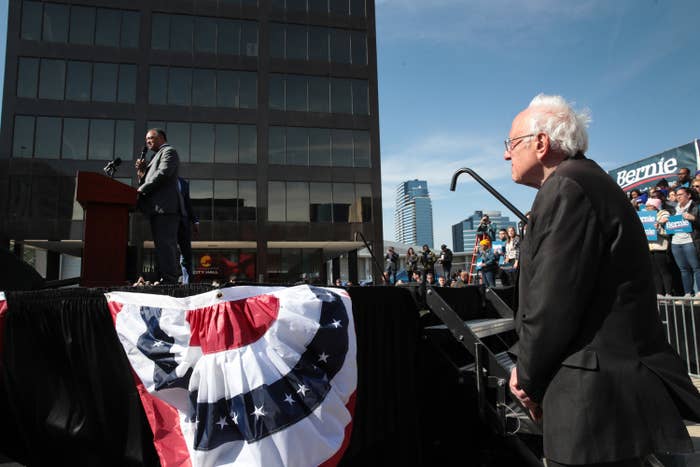
“You have a choice between two kinds of liberalism,” a Wisconsin official explained to the New York Times. “You have this pragmatic, I-can-win-the-election liberal, and you have this articulate, I-can-tell-you-what-you-believe-in-your-heart liberal.”
Pictured next to the quote: Jesse Jackson, tall and crisp, sitting down to breakfast with a family in their Wisconsin home. He’d recently won the 1988 Michigan caucus after winning across the South. A few days later, Michael Dukakis — the pragmatic, I-can-win liberal — crushed him.
A few weeks after the Wisconsin primary, in Burlington, the city’s mayor, Bernie Sanders, caucused for Jackson despite not being a member of the party.
“I resent intruders who would undermine and destroy the Democratic Party,” announced one resident from the podium.
A woman shouted in response from the back, “We want unity among ourselves, not with a group of outsiders.” Then she walked up to Sanders and slapped him across the face.
By then, the Democratic electorate had mostly consolidated, delivering big loss after big loss to Jackson, even as he continued speaking to rolling crowds across the country. “Other candidates — vice presidents and governors — might go weeks or an entire campaign without crowds as vibrant as Jackson’s leftovers,” wrote David Maraniss in May that year. Jackson came close, so close, to the moment where all things start to fall in place, where winning begets winning, and the nomination takes hold.
But the moment just collapsed.
“As long as people could vote for him as sending a message to Democrats, saying [that] we support this kind of economic populist and moral voice, they were anxious to vote for him,” Robert Borosage told Jackson biographer Marshall Frady in the 1990s. “But as soon as he got close to actually winning the nomination, I think people just said, ‘Whoa. We’re never going to do this.'”
“The fear factor took over,” the late Bert Lance, an ally of Jackson’s in the 1980s, told Frady. “There were people saying, ‘Oh my goodness, Jesse Jackson has a chance to gain the Democratic nomination, what’s this going to do to my seat in Congress, to my race for county commissioner, to the mayor’s race?’” (The Los Angeles Times the week of the Wisconsin primary: “What worries them is not that Jackson is unelectable. They are worried they may be unelectable running on a Jackson ticket.”)

Jackson was dealing with far different circumstances as the first black candidate to make a serious run at a presidential nomination, and his own set of problems (his 1984 bid was partially derailed by his reluctance to denounce Louis Farrakhan). And Sanders will never have the elegance or dynamism of Jackson at his peak.
But as plenty of people have pointed out — including Jackson himself — Sanders’ two campaigns are interpretations of Jackson’s two campaigns, alike in radicalism, alike in establishment skepticism, and alike in the aspiration of a multiracial “rainbow coalition” that achieves “economic justice.”
Jackson ran on big increases in taxes on the wealthy, big reductions in defense spending, and government-funded health care (“If government-supported health care is good enough for Congress and the Supreme Court and the White House, then it’s good enough for your house and my house”). He ran, too, against prevailing notions that the economy was in strong shape. “A kinder, gentler nation, yeah,” he said while campaigning for Dukakis during the 1988 general election, “kinder and gentler for the corporations and the merger maniacs and the mega conglomerates swallowing up the family farmer and taking factory jobs overseas. Urban America looks like it’s been bombed out, rural America abandoned like a plague’s hit. Family farms gone, jobs out, drugs in, profits up, wages down, workers abandoned.”
Above all, the ethos of that 1988 campaign centered around a cross-racial, cross-gender emphasis on economics, the exact same thesis of Sanders’ 2020 campaign: “When they close down your factory or foreclose on your farm,” Jackson said then, “and comes the time when they pull the plug and the lights go out, we all — we all — look amazingly similar sitting there in the dark.”
Sanders is ending up in about the same spot as Jackson in 1988: losing. On Tuesday, Joe Biden dominated the kinds of working-class states where Sanders performed well in 2016. And if you were going to try to engineer a comeback against a fixture of national politics, the worst possible one-two the day before: a pandemic combined with a market crash.
It’s a sequence that automatically produces the desire for a gentle hum. “I wish he would just be quiet,” Biden said of Donald Trump on Monday. “I really mean it. That’s an awful thing to say about a president; I wish he’d be quiet. Just let the experts speak and acknowledge whatever they suggest to him is what we should be doing.”
But the results in Michigan and elsewhere this week reflected the existing, underlying trends of the 2020 primary, the brick wall both Jackson and Sanders have run into: The coalition still isn’t big enough.
Jackson won the vast majority of black voters during his campaigns; he led a big transformation in the electoral process, actually, through a series of voter registration drives in the 1980s, as well as in his two campaigns, with both voting and staffing patterns. (He also effectively lowered the delegate threshold from 20% to 15% and reduced the number of superdelegates.) And he did grow his coalition, performing significantly better in very white states like Minnesota. But he never won enough white voters in states like New York and Ohio to make the rainbow coalition a reality.
In 2020, like Jackson between 1984 and 1988, Sanders has grown his coalition to a real degree: Latino voters powered his wins in Nevada, California, and Colorado. His command of voters under the age of 30 will likely have serious, lasting consequences electorally. But despite the advertising and the efforts to organize in states like the Carolinas, Sanders has not meaningfully improved on his support with black voters, particularly the middle-aged and older voters who now decide Democratic primaries. He remains someone without the long-standing relationships with black leaders, who welcomes but does not persuade, whose ask of the electorate about defeating Trump retains an air of risk.
So how do you make the cross-generational, cross-racial economic coalition come alive? This is the essential question the ascendant, economic left faces in the 2020s.
Jackson himself told the New York Times as much in January: Despite his belief that Sanders' and Elizabeth Warren’s ideas represented the future of the party, they hadn’t persuaded the kinds of middle-aged and older black voters they would need to win. “You must build a coalition and you do it through new relationships,” he said.
Warren’s own (failed) bid to be the “unity” candidate gestured at that necessity. But even she complicated the idea by unleashing what Kerry Howley described as “enthralling brutality.” As she dismantled Michael Bloomberg’s presidential bid, her campaign started a “blood and teeth” refrain — a reference to her remark that her first priority would be empowered consumer protection and if she couldn’t get that, she’d leave blood and teeth on the floor. When the candidate dropped out last week, after months of enduring cheer, up went a true rage from within the Warren universe at other candidates and the press. They might be right to be angry (leave that aside) but it suggested dissonance between unity and the enthralling brutality — that if there were a coalition to be built for Warren, it could only be built in the image of insurgency.
That dichotomy between aggression and welcome obviously consumes commentary about the Sanders movement, but at a much higher pitch. Take in the same week, his supporters calling up the Culinary Union leadership to tell them they’re “bitches” and “whores” for criticizing Medicare for All, and a Culinary Union member saying as she caucuses for Sanders: “I worry about other people that aren’t protected by unions. How do they get health care?” It’s the difference in whether Warren was sent from hell to destroy Sanders or a powerful figure whose endorsement would move many toward his bid when it matters most.
Is it the hostility, though, or the lack of long-standing relationships? The late-in-the-game panic about someone with old-school, ’60s radical views of Cuba? The proclamations that the “nervous” establishment will be defeated?
Clearly, though, there is at least one person thinking seriously about the long-term issue of coalitions. “There are folks telling Warren what to do now, when they weren’t in her camp,” Rep. Alexandria Ocasio-Cortez told the Washington Post. “It’s not up to me to tell her what to do. What I do know is that if we want to win Medicare-for-all, we have to build overall.” During an Instagram Live on Tuesday night, as the returns came in, she admonished people who blamed older voters for the results. She told viewers, “We don't dismiss voters. We don't think [of] people as disposable. Your vote matters.”
On Sunday, she introduced Sanders in Ann Arbor and referenced the “David and Goliath” speech given in the 1980s by Jackson, who’d endorsed Sanders earlier that day.
“In order for us to win, we have to grow,” Ocasio-Cortez ultimately built up to. “We have to grow. We must be inclusive. We must bring more people into this movement. We must shed the unnecessary clothes of cynicism and exclusion and we must turn toward an embracing posture where all people are welcome into a people's movement.”
